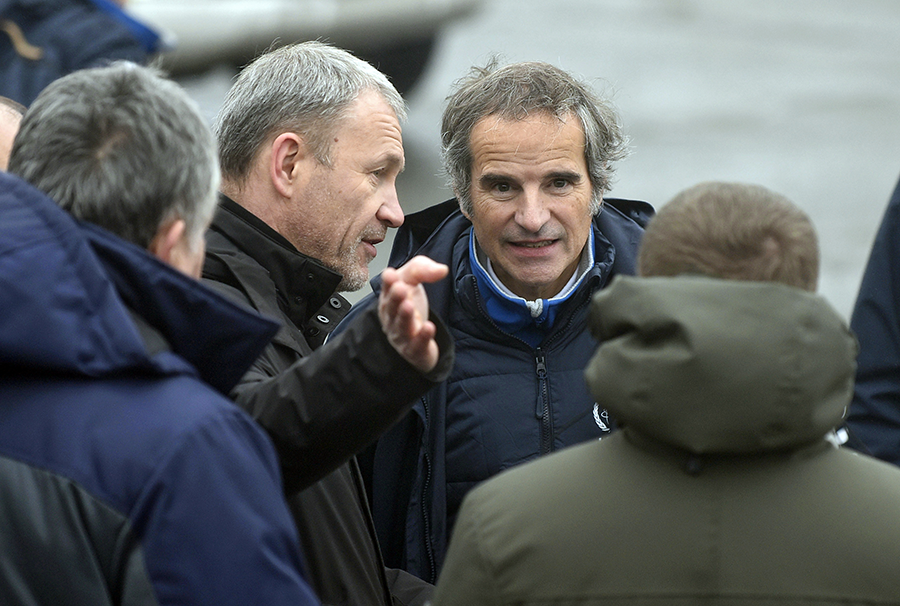IAEA Presses for Safety Zone in Ukraine
March 2023
By Kelsey Davenport
The head of the International Atomic Energy Agency (IAEA) traveled to Russia and Ukraine in early 2023 to continue discussions on establishing a safety zone around Ukraine’s largest nuclear power plant, but officials from the two countries do not appear optimistic that negotiations will succeed.
 Russia attacked the Zaporizhzhia nuclear power plant in March 2022 and continues to occupy the Ukrainian facility in violation of international law. (See ACT, April and June 2022.) Shelling in and around the plant over the past year repeatedly has cut power to the facility and damaged buildings at the site, raising the risk of a nuclear accident. (See ACT, September 2022.) Russia and Ukraine deny responsibility for the attacks on the site. To mitigate the risks of a radiation release, Ukraine shut down the six reactors at the facility.
Russia attacked the Zaporizhzhia nuclear power plant in March 2022 and continues to occupy the Ukrainian facility in violation of international law. (See ACT, April and June 2022.) Shelling in and around the plant over the past year repeatedly has cut power to the facility and damaged buildings at the site, raising the risk of a nuclear accident. (See ACT, September 2022.) Russia and Ukraine deny responsibility for the attacks on the site. To mitigate the risks of a radiation release, Ukraine shut down the six reactors at the facility.
Meanwhile, to help prevent a nuclear accident and assist Ukrainian personnel operating the facility, IAEA Director-General Rafael Mariano Grossi established a permanent IAEA presence at the site in September and is trying to negotiate a protection zone around the facility. In December, Grossi expressed hope that such a zone could be established by the end of 2022.
After meetings in Moscow on Feb. 9–10, Grossi said that he discussed current plans for the zone in detail with senior Russian officials and that he remains hopeful that a zone will be established.
In his Feb. 9 statement, Grossi reiterated that the current situation at Zaporizhzhia is “very precarious” and said that “we cannot lose any more time.” Before traveling to Moscow, he said that “more determined efforts are required from all sides” to reach an agreement. He also noted that recent shelling around the plant prevented a new IAEA team from rotating into the site.
Alexei Likhachev, head of the Russian nuclear energy company Rosatom, met Grossi during the Moscow trip and said the talks “will give us a chance to get a step closer” to creating a safety zone.
Rosatom stationed personnel at Zaporizhzhia and reportedly plans to connect the power plant to the electric grid in Crimea. But Ukraine’s nuclear regulator said in January that it will only allow Zaporizhzhia to resume generating power after the plant has been returned to Ukrainian control and inspected to ensure that the reactor units can operate safely.
Prior to Grossi’s trip, Russian Deputy Foreign Minister Sergei Ryabkov said on Jan. 30 that negotiations over the zone are “not progressing easily.” He said Moscow is waiting for Kyiv to respond to its proposals for the zone and accused Ukraine of “just stalling.”
Although Ukrainian officials support the creation of a zone, Petro Kotin, the head of Ukraine’s nuclear energy company Energoatom, said on Jan. 4 that he does not think that establishing it is “realistic” at this point and predicted that the Ukrainian military will need to retake the site by force. He called for sanctions against Rosatom until the Russians “end the illegal capture of civilian facilities.”
Ukrainian Prime Minister Denys Shmyhal said that Ukraine is asking for the resumption of control of Zaporizhzhia and the “complete withdrawal” of all Russian troops and Rosatom personnel from the facility.
After meeting Ukrainian President Volodymyr Zelenskyy on Jan. 19, Grossi said that although the negotiations on the zone are “very complex,” everyone agrees that the nuclear power plant “needs to be protected.”
While in Ukraine, Grossi also announced that the IAEA established a permanent presence at the three other operational nuclear power plants in Ukraine and at Chernobyl. IAEA personnel will provide “technical assistance and advice” and assess needs at the nuclear power plants, Grossi said.
Grossi said the IAEA is “here to stay” in Ukraine “for as long as we are needed.”
He noted that the establishment of the IAEA presence at the sites “marks a major milestone in our efforts to help Ukraine ensure nuclear safety and security during this tragic war.”
